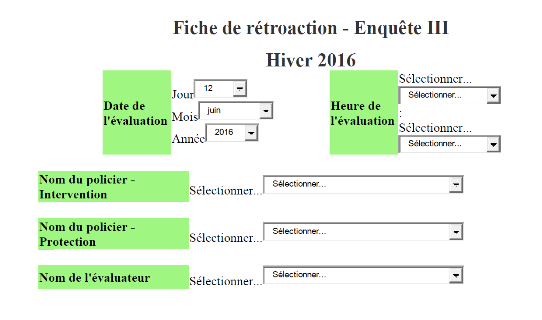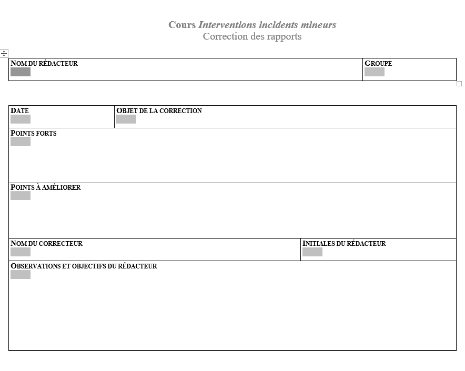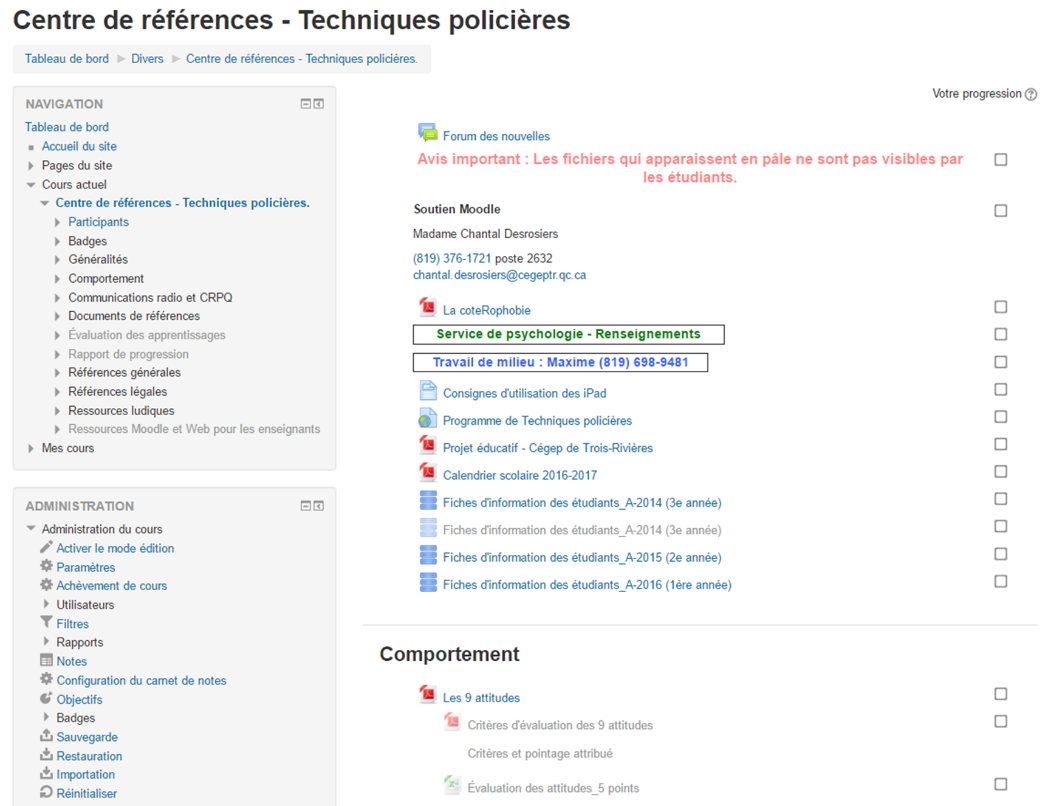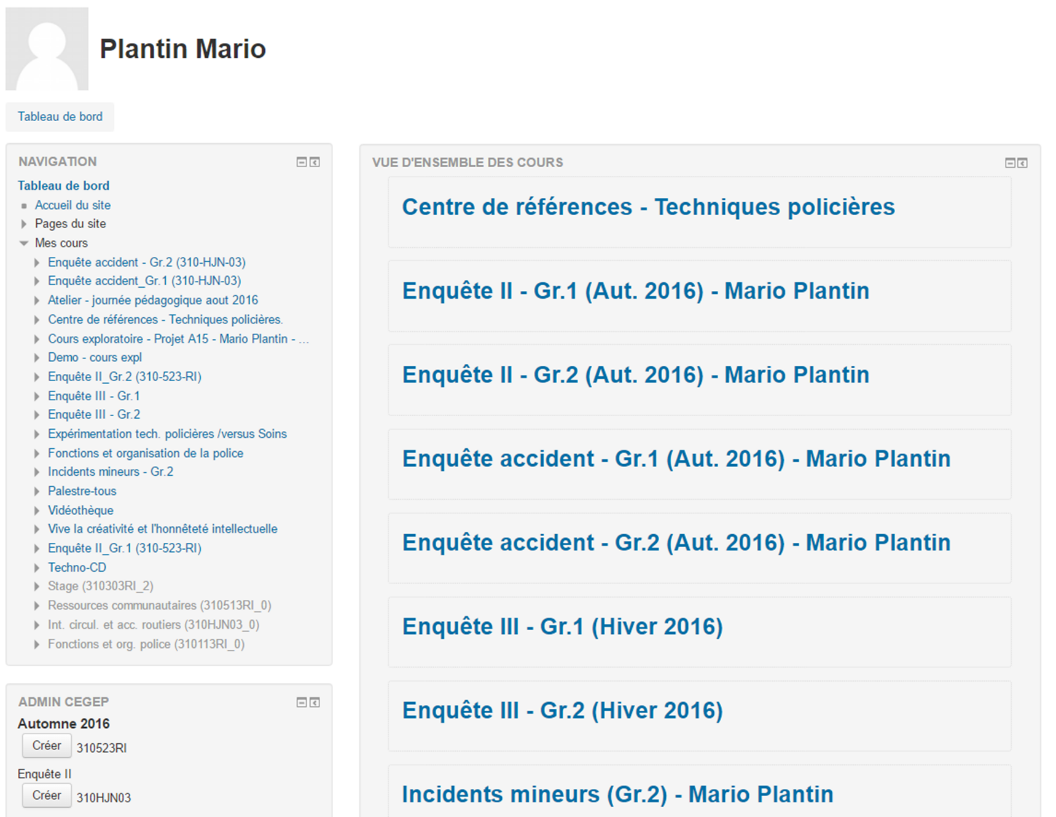Peer Assessment via Moodle, It’s Possible!
Since I have been using Moodle I have completely changed my pedagogical approach. And I will never go back.
This platform provides a number of advantages to students, to my colleagues, and to myself, which improve teaching, but also, and especially, learning. In addition to being a platform through which useful information and practises for the students are grouped together, it also facilitates exchanges between them and the teachers. It allows for a somewhat new type of use: self-evaluation by peers, also called peer assessment.
Developing Responsibility through Peer Assessment
I was a police officer for 30 years and on duty for 13 years at the École nationale de police du Québec (ENPQ). Since 2014 I have been teaching in Police Technology at Cégep de Trois Rivières. My philosophy can be summarized like this:

My philosophy of thinking!
There is nothing like collaboration between colleagues to enhance learning and to enable the development of helping each other and solidarity, important police-related values to acquire in this field of work.
Peer assessment is, in my opinion, a way to contribute to achieving the targeted competencies.
The main objectives that I pursue daily are:
- To make student-observers more active during the simulations in class
- To make students aware of their responsibilities and develop their autonomy
- To help the students integrate evaluation criteria
How to proceed to better reach these 3 objectives? By means of self-evaluation through peer review, also called peer assessment. And how to do this in a quick, simple and standardized way? By means of a very common computer platform in many CEGEPS: Moodle.
The Context
In Police Technology, as part of several courses, we use a simulation approach to allow students to concretely integrate their competencies (knowledge, skills, interpersonal skills). Even though they have to participate in giving feedback after each simulation, students don’t all put in the same amount of effort. Consequently, until very recently, during the interventions of their colleagues, many students were being passive observers. In order to have more active students, I therefore prepared a simple evaluation form with the help of the Data Base tool by Moodle. In this way, at the same time as watching the simulations, each student must answer different questions in relation to what they are observing.
Obviously, if I wanted to ensure the seriousness of this approach, I would need a convincing incentive. This is incidentally, I believe, what distinguishes our approach from a traditional peer evaluation approach. In Police Technology, it is in fact thanks to the resources offered by Moodle, that the observer is the one being evaluated. This way, in addition to making the effort in a serious manner, the students must stay active and are obligated to share their observations, allowing them to attain a solid-level of peer assessment and therefore sharing their expertise between themselves.

Example of a form for students to fill in on Moodle during peer assessment.

Example of a standardized form to be filled in by students on Moodle during peer assessments.
The Choice of the “Moodlistic” Approach
At the beginning of my process, I was pushed by my interest in computer technology and by my curious nature. In my beginnings as a teacher at Cégep de Trois-Rivières, I used Google Drive in order to post and share my documents on line. It was during a conversation with Chantal Desrosiers, IT Representative, that I learned about a training workshop on the use of this Moodle platform. So, I decided to follow the simple and fun training, to discover this tool and to then use it with my students.
I haven’t used anything else since! All of my courses are now put on Moodle and are available quickly and in the same way for all of my students. Many of my colleagues have also caught the “bug” and they have started installing their courses on this platform, which allows us to share certain useful tools in our different courses. From time to time, I provide them with technical help, within the limits of my capabilities of course, when my colleagues try new functions offered by Moodle. Collaboration is not just for students.
We must not forget that we are “role models” for our students. We must be representatives of the values of the police force.
In order to make sharing and collaboration a reality, the creation of a “Reference Centre (virtual) in Police Technology” was therefore a totally natural choice to centralise all the necessary documents and information for our program.

Part of the common information found in the virtual reference centre of Moodle.

Moodle dashboard in which we find the Reference Centre in Police Technology as well as other documents specific to our program.
The forms to use are simple, standardized, and especially, they are computerized using the data base of Moodle. We can find numerous documents, such as pedagogical tools, jurisprudence cases, police values to acquire by the students or even legal references.
Furthermore, thanks to this platform, a number of my colleagues and myself can rapidly evaluate the knowledge of the students, their analytical capacity and their comprehension of the pedagogical tools used with the help of documents solely accessible to teachers. An additional time-saver that is not insignificant!
Results Observed Following the Use of Peer Assessment via Moodle
Since my first trials in class, I have had the opportunity to analyse my pedagogical choices and to draw several conclusions:
- A better understanding and use of the processes and helpful tools by the students.
- The ability of the students to observe the same strengths and the same difficulties as the teachers.
- More exchanges between students so as to clarify the observed elements.
- Peers become allies capable of defusing disagreements and crises.
A survey was also given to students in order to test this approach. Here is what stands out (%= in agreement with the statement):
- Useful to provide feedback of the simulations between colleagues (91%)
- Use of an electronic form is appropriate (95%)
- Accessibility to feedback written by peers (80%)
- Improvement of student competencies (knowledge, attitudes, techniques) by means of feedback (95%)
- Other courses should also adopt this approach (68%)
It seems that the report is very positive, seeing as numerous values specific to the training in Police Technology are freely demonstrated by students: responsibility, cooperation and exchanges between peers. The objective has been reached!
This approach of peer assessment is accepted well by students. Reluctant to this type of exercise in the beginning, they are now asking for more! The majority see the benefits in their learning and their responsibility. In addition, I believe this method, through Moodle, is completely accessible and transferable to other disciplinary fields, as much in professional programs as regular programs.
Enough listening about my story, now it’s your turn to try it and to share your experience!

